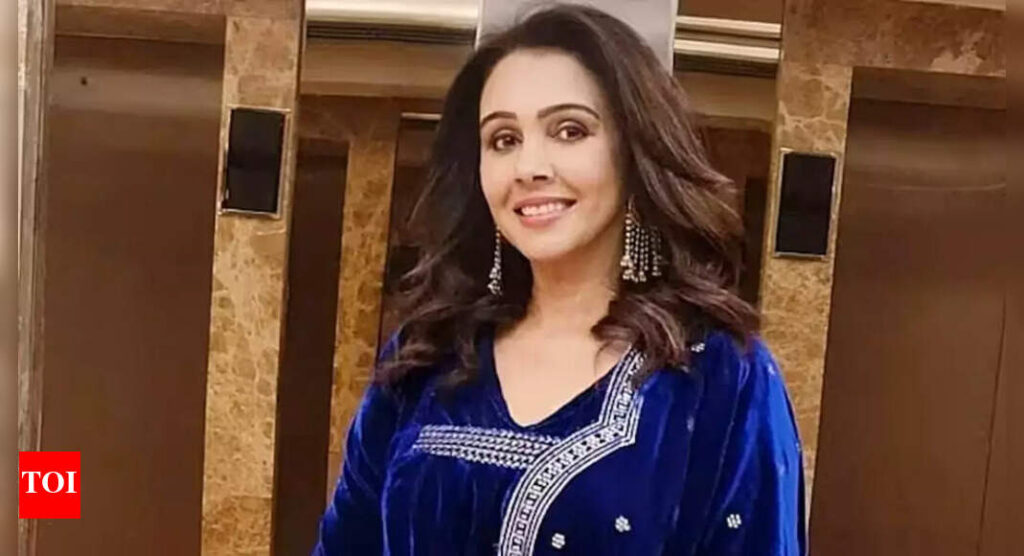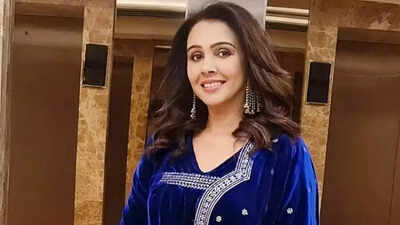From her early fame in Chunauti, followed by Kabhi Haan Kabhi Naa to her soulful music and fearless writing, Suchitra Krishnamoorthi has always walked her own path—unapologetically. A multifaceted artist and single mother, she’s defied industry norms, taken bold personal decisions, and returned to the spotlight entirely on her own terms.
In this candid conversation with ETimes, Suchitra opened up about her podcast The Music Stories, supporting her daughter Kaveri Kapur’s creative journey, and the emotional complexities of divorce from veteran filmmaker Shekhar Kapur and motherhood. She also reflected on the lessons life has taught her—offering young artists a mantra that feels both grounding and empowering.
You’ve been a singer, actor, writer—and now a podcaster as well. How do you view your creative evolution over the years?
I’d say it’s been a fulfilling journey—challenging at times, but definitely rewarding. I began as a singer and actor, but over time, I’ve gravitated toward the creative process itself. Writing my own shows, developing my podcast, composing songs—it’s been a slow yet enriching transformation. I’m learning to shape my own path instead of waiting for opportunities to come my way. I feel grateful to be able to bring my ideas to life. I hope to do much more in the coming years.
You’ve experienced fame even before Kabhi Haan Kabhi Naa and now to The Suchitra Krishnamoorthi Show. And then there was a bit of silence, followed by reinvention. So, what phase of life are you in now?
I’d say I’m in a phase of self-discovery. I’m learning to live in the present and embrace it fully. It’s a very peaceful space—free from anxiety or insecurity. But I still want to give this moment my absolute best.
I don’t necessarily see it as reinvention, but if others do, I take that as a compliment. I’m just following my creative instincts and stepping out of my comfort zone. Content creation, especially on YouTube, is a whole new world for me. I didn’t realize how massive—and demanding—it would be. But I’m diving in with full enthusiasm and hope to connect with an audience that resonates with what I do.
The Music Stories is definitely niche. It’s a hybrid between a documentary and a talk show. Even YouTube described it as a new genre altogether. It’s storytelling mixed with conversations, and while it may be a slow burn, the response so far has been encouraging. I’d love for more people to watch it and share their thoughts. I genuinely feel like a newcomer again—in a completely different world. I’ve developed a newfound respect for content creators—it’s a lot of work and requires serious commitment.
What inspired you to create The Music Stories podcast?
I wanted to create something of my own—on my terms. And music felt like the most natural subject since it’s something I know and deeply connect with. I wanted the podcast to have value—not just be entertaining, though if it entertains, that’s a bonus. The core of it lies in the research and the stories behind the music.
You mentioned feeling like a newcomer with this podcast. So, when you entered the industry at a young age, was fame ever overwhelming for you?
Not at all. Fame came naturally to me. In fact, I always expected it would be a part of my life. The real surprise was when it wasn’t—when it suddenly disappeared for a while.
So, you always wanted to be a singer and actor?
I was always active in singing and acting on stage, though my background was more academic. I hadn’t really considered acting seriously until Chunauti came along. Singing, yes—I always felt I’d pursue that. But Chunauti changed the course of my life. Even then, I had promised my parents that I’d focus on my studies after that show! So yes, I knew I’d be famous—I just didn’t know how. But fame should never be the goal. It’s just a by-product of doing meaningful work.
Unfortunately, in showbiz, fame becomes the metric for success. Unlike other fields—where you can be brilliant without being known—here, without fame, your work often doesn’t get noticed. And that’s something I’m exploring in The Music Stories. So many incredibly talented artists have remained in the shadows simply because they weren’t commercially famous. That doesn’t make them any less brilliant. They’ve spent years—sometimes up to 18 hours a day—perfecting their craft. But without fame, they remain unknown. These are the stories I want to share. Because in showbiz, without fame, your career doesn’t really take off.
Was there ever any pressure to maintain a certain image in the industry, especially since you became famous at such a young age?
Not at all. If I’d been focused on maintaining an image, I wouldn’t have made half the choices I did. I broke every stereotype—I walked away from my career before it had fully taken off, married unconventionally, and returned to the industry just as unconventionally. So no, I never felt that pressure. But I know many people do. I simply don’t. And honestly, I don’t think any artist should. It has to come from within. Outside validation can’t define your creative path.
Kaveri mentioned acting was never on her radar. But now that she’s exploring it, how have you supported her while allowing her to find her own artistic identity?
Carving your own identity is at the core of being an artist. Kaveri never showed any interest in acting growing up. In fact, she got some offers when she was just 13 or 14 and turned them down. Then one day, while studying in Boston, Kunal offered her a film. She auditioned, got the part—and only told us afterward!
Once she decided, of course I supported her. I support every decision she makes. She’s a kind, grounded young woman who would never do anything wrong or harmful.
Having been in the business myself, I know unsolicited advice can often backfire. I hate to use the word, but sometimes it’s just a complete mindfuck. You have to let people find their own way. If they ask, and you feel strongly, then yes—say something. Otherwise, let them learn.
I tell myself the same: let me make my mistakes. Let her make hers. We’re there to catch her if she falls, but she has to walk her own path. That’s the only way you grow. You don’t become extraordinary by living in fear or blindly following others.
You may even subconsciously sabotage it. That’s why I believe every artist should follow their instincts. I’ll always be there for her—but her journey is hers alone.
Was it difficult for you to balance being an artist and a single mother?
Incredibly difficult. Probably why I stepped away from work for so long. I was completely consumed. But it’s okay—that phase shaped who I am today. And just like I had to go through that, she’ll have her own experiences that will shape her.
Looking back, are there any roles you regret turning down—or wish you hadn’t taken?
Maybe a few cameos I did—mostly for friends or because the script looked great on paper—that didn’t add much to my craft or joy. But it’s fine. It’s all part of the journey. One of the most valuable lessons I’ve learned is that regret is the most useless emotion. What’s done is done.
Now that you’re stepping into the digital space, do you see social media as a blessing or a burden for artists today?
Look, you don’t have to go to the temple every day—God understands. But when you do go, go with sincerity. It’s the same with social media. If you treat it like an obligation, it becomes a burden. But if you approach it with joy, it becomes a beautiful tool. So for me, it’s a blessing.
If you could rewrite your film journey, is there anything you would do differently?
I wouldn’t have married so young. That’s the only thing I’d change. I don’t impose anything on Kaveri, but I do tell her: your life partner is the most important decision you’ll ever make. It shapes the entire course of your life. Choose wisely.
Kaveri said she understood and accepted your divorce—but it did take an emotional toll.
Of course. It’s always hard on children. No child deserves to go through that kind of emotional upheaval. They deserve joy, stability, and security. It’s painful and unfair.
How did you deal with it—and help her cope?
Honestly, I was struggling myself. I wish I’d handled it better, but I wasn’t equipped then. I was doing the best I could with what I knew.
But now it’s heartening to see you and Shekhar ji coming together to support her.
Always. She’s my baby—my top priority. I’ve been a full-time mom. We’ve always had a strong bond. But I want her to blossom on her own terms—and she’s already doing that.
What message would you give young artists who feel overwhelmed by the pressure to stay visible or relevant?
Karte raho. Just keep going. No pressure. You never know when the universe will smile at you. That’s the artist’s job—to keep creating. The rest is in God’s hands. That’s what I believe.


